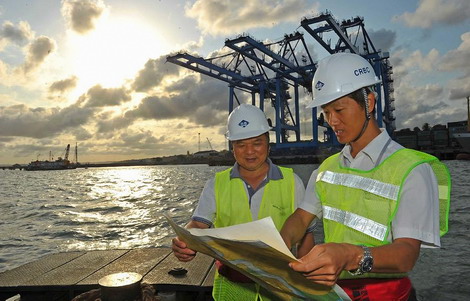 |
|
|
|
|||||||||||
|
 |
|
Technicians from China Road and Bridge Corporation work at a port construction site in Mombasa, Kenya. [Photo / Xinhua] |
Central SOEs ordered to stay out of financial investment and non-core areas
Central government State-owned enterprises have been ordered to stay out of financial investment and other non-core activities overseas in a move to improve regulation of outbound investment by SOEs.
The order, effective May 1, came in a provisional regulation from the State-owned Assets Supervision and Administration Commission, which supervises about 110 central SOEs.
The regulation is the third of its kind regarding central SOEs' overseas investment. Measures covering assets and property rights were released during the past two years.
The latest regulation states that central SOEs are "in principle" forbidden to invest in non-core businesses abroad, though the commission can approve cases where there is a special need.
"One of our major tasks this year is to strengthen oversight of SOEs' investment by ordering them to suspend or postpone projects unrelated to their core business and those lacking competitiveness," said Shao Ning, deputy chief of the commission.
As central SOEs have expanded abroad, their overseas investment has become increasingly diversified.
Their investment destinations have evolved from Asian and African countries to Europe and the United States, and the target industries have shifted from resources and manufacturing to services and finance.
SOEs are supposed to improve their risk-prevention capacity while taking advantage of global capital markets, the commission said.
Yang Bin, a researcher at the Chinese Academy of Social Sciences, a government think-tank, said central SOEs should not engage in financial investment such as international hedging, which could easily be subject to manipulation.
"In the current volatile global economy, some enterprises may move to invest in financial products, which they might see as more profitable than investment in industry.
"However, the risk can be extreme in unstable financial markets," Yang added.
Du Shengxi, a spokesman for China Communication Construction Co Ltd, told China Daily the new regulation gives enterprises a clear view of their overseas investment plans.
Du said China Communication Construction has been focusing on investment related to its core business, including the construction of ports, docks, roads and bridges, since it began to expand abroad.
The largest State-owned builder of transport projects will establish its first overseas investment company, with the investing ability of $500 million, in Hong Kong in the first half to speed up the company's global expansion.
At the end of 2010, central SOEs held 2.66 trillion yuan ($422 billion) in assets outside the Chinese mainland, up 50 percent from 2009.
The enterprises' total profit between January and November grew 28 percent year-on-year.
Shao said China's overseas assets have been profitable. Revenue generated from foreign assets accounts for 37 percent of central SOEs' total revenue.
The new regulation also clarifies the definition of overseas investment and specifies SOEs' investment regulatory responsibilities and overseas investment procedures.
The commission said that central SOEs' overseas investment is still in its infancy, and the companies lack maturity in strategic service awareness and market research.
baochang@chinadaily.com.cn